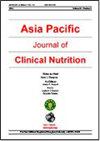含益生菌的围手术期肠内免疫营养有利于消化系统手术中的营养、炎症和功能状态。
IF 1.3
4区 医学
Q4 NUTRITION & DIETETICS
Asia Pacific journal of clinical nutrition
Pub Date : 2022-03-01
DOI:10.6133/apjcn.202203_31(1).0009
引用次数: 0
摘要
背景与目的本研究旨在评估肠内免疫营养(EIN)对消化系统手术围手术期患者营养状况的影响。方法与研究设计回顾性分析2017年8月至2021年2月期间接受胃肠道手术的102例患者的临床数据。根据营养支持方案,将患者分为肠内营养(EN)组(50名患者)和EIN组(52名患者),结论EIN组能促进胃肠功能恢复,改善营养状况,增强体液免疫功能,调节肠道菌群平衡,改善肠道通透性,预防肠内喂养不耐受,并减少因消化系统疾病而接受手术的患者的并发症。本文章由计算机程序翻译,如有差异,请以英文原文为准。
Perioperative enteral immunonutrition with probiotics favors the nutritional, inflammatory, and functional statuses in digestive system surgery.
BACKGROUND AND OBJECTIVES
This study aimed to evaluate the effects of enteral immunonutrition (EIN) on the nutritional status of patients during the perioperative period of digestive system surgery.
METHODS AND STUDY DESIGN
The clinical data of 102 patients who underwent gastrointestinal surgery between August 2017 and February 2021 were retrospectively analyzed. According to the nutritional support regimen, the patients were divided into an enteral nutrition (EN) group (50 patients) and an EIN group (52 patients).
RESULTS
The times (in hours) to return of the first bowel sound, first postoperative flatus, and first bowel movement, as well as the length of postoperative hospital stay were shorter in the EIN group than in the EN group (p<0.05). The concentrations of hemoglobin, prealbumin, albumin, and transferrin, as well as the concentrations of immunoglobulin A (IgA), immunoglobulin G (IgG), immunoglobulin M (IgM), complement C3, and complement C4 were higher in the EIN group than in the EN group at 1 and 7 days after surgery (p<0.05). The concentrations of endotoxins, D-lactic acid, and diamine oxidase were lower in the EIN group than in the EN group (p<0.05). The tolerance to enteral feeding was better in the EIN group than in the EN group (p<0.05). The incidence of complications was lower in the EIN group (5.77%) than in the EN group (10.0%) (p>0.05).
CONCLUSIONS
EIN can promote gastrointestinal function recovery, improve the nutritional status, enhance the humoral immune function, regulate intestinal flora balance, improve intestinal permeability, prevent enteral feeding intolerance, and reduce complications in patients undergoing surgery for digestive system diseases.
求助全文
通过发布文献求助,成功后即可免费获取论文全文。
去求助
来源期刊
CiteScore
2.50
自引率
7.70%
发文量
58
审稿时长
6-12 weeks
期刊介绍:
The aims of the Asia Pacific Journal of Clinical Nutrition
(APJCN) are to publish high quality clinical nutrition relevant research findings which can build the capacity of
clinical nutritionists in the region and enhance the practice of human nutrition and related disciplines for health
promotion and disease prevention. APJCN will publish
original research reports, reviews, short communications
and case reports. News, book reviews and other items will
also be included. The acceptance criteria for all papers are
the quality and originality of the research and its significance to our readership. Except where otherwise stated,
manuscripts are peer-reviewed by at least two anonymous
reviewers and the Editor. The Editorial Board reserves the
right to refuse any material for publication and advises
that authors should retain copies of submitted manuscripts
and correspondence as material cannot be returned. Final
acceptance or rejection rests with the Editorial Board

 求助内容:
求助内容: 应助结果提醒方式:
应助结果提醒方式:


